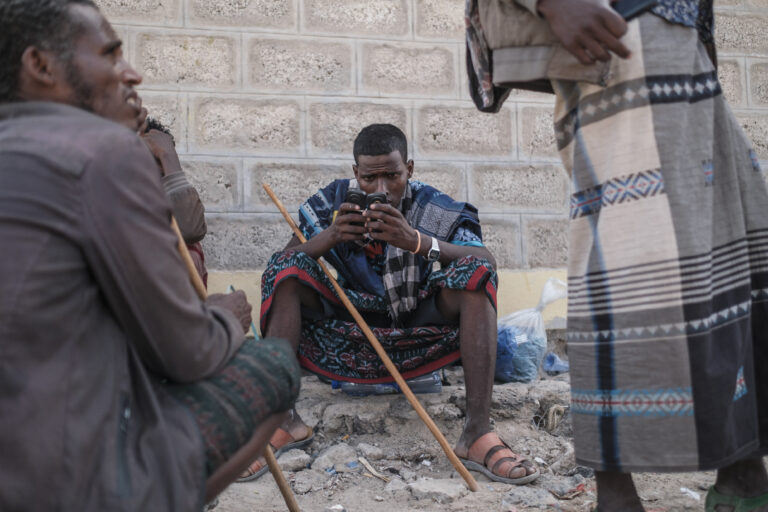(EFJA/IFEX) – The following is a 17 August 2002 EFJA statement: Position statement issued by Ethiopian free press journalists and media professionals on the new press law and the Journalists’ Code of Ethics that is in the process of being drafted by the government. The Ethiopian Free Press Journalists’ Association (EFJA), its entire membership, free […]
(EFJA/IFEX) – The following is a 17 August 2002 EFJA statement:
Position statement issued by Ethiopian free press journalists and media professionals on the new press law and the Journalists’ Code of Ethics that is in the process of being drafted by the government.
The Ethiopian Free Press Journalists’ Association (EFJA), its entire membership, free press publishers and representatives of sections of society that have good and close relations with the free press held a half-day meeting at the Semien Hotel in Addis Ababa on August 17, 2002, at which they discussed issues surrounding the free press and the rights and obligations of free press journalists.
At the meeting, we Ethiopian free press journalists and media professionals held wide-ranging and in-depth discussions on:
1. The implementation of Press Proclamation No. 34/92 and the new draft law prepared by the government, which is to be presented to Parliament.
2. The draft code of ethics for journalists, publishers, free press distributors and newspaper vendors, which the government prepared through the Civil Service Reform Programme Sub-committee.
3. Basic ways through which we journalists can efficiently fulfill our public, national and professional obligations without any external intervention or supervision, by observing a Journalists’ Code of Ethics that we have endorsed voluntarily and which we have expressed our total commitment to implementing.
After having exchanged ideas surrounding the above-mentioned points, we participants at the meeting issued a twelve-point position statement, so that the Ethiopian government, relevant (appropriate) bodies, as well as national and international press institutions can focus on it and consider the danger that the new press law and code of ethics would pose on the very existence of the press and on the on-going democratization process.
1. The Press Law in force, which was issued before the constitution, lacks clarity and elaboration. Media professionals did not participate in the drafting of the Press Law. The preparation and drafting of a new Press Law is inappropriate at a time when the Ethiopian Free Press Journalists’ Association (EFJA), counterpart associations throughout the world and organizations that fight for the rights of journalists have been urging the Ethiopian government to amend the existing Press Law.
2. A Journalists’ Code of Ethics must be drafted, approved and implemented by journalists themselves, without any external intervention, and not by an outside body. The EFJA and its members are strongly opposed to the government’s drafting and enforcing of a code of ethics.
3. The new Press Law and Code of Ethics deprive citizens of the right to exercise their freedom of expression and exchange ideas and will cause the cancellation (withdrawal) of press licenses. We therefore call on the Ethiopian people, civic associations, political parties, governments that extend support to the construction of a democratic system, human rights activists and organizations that promote the rights of journalists to stand solidly behind us and make a clarion call.
4. The EFJA has its own code of ethics that has been drafted, approved and enforced by its members. This being the case, we are strongly opposed to the government’s activities, which are calculated to impede the rapid development of the free press, under cover of enforcing a code of ethics. We urge the government to refrain from engaging in such activities.
5. At a time when the Ethiopian Free Press Journalists’ Association (EFJA) and its members are making efforts to establish a Press Council based on their own freedom, the government is making attempts to create a Press Council in its own image and put the process under its control. This attempt will seriously encroach upon democratic rights and put the free press under the clutches of government. We are therefore strongly opposed to the government’s approach in this area.
6. The Ethiopian free press that emerged in Ethiopia only ten years ago is still at its rudimentary stage. Because it operates by carrying aloft slogans of a new tradition and change, there is no question that the free press has shortcomings. The Ethiopian free press can make mistakes because of a lack of sufficient experience. But these mistakes can be corrected and adjustments can be made through educating and training journalists and not through punishment, imprisonment and issuing restrictive and repress laws. We therefore call upon the relevant government bodies to examine this situation in this spirit.
7. We urge the government to:
a. Refrain from attacking free press publications through media services under its control;
b. Immediately discontinue its incrimination and propaganda campaign, which alleges that the press publications are organs of political parties (the government has so far not identified the publications which it alleges are party organs);
c. Refrain from engaging in activities that are calculated to isolate the people from the free press.
8. we call on the government to:
a. Immediately stop its intervention (under the guise of subsidizing “responsible press publications”), which is calculated to create divisions among members of the free press;
b. Limit itself to its own activities and responsibilities.
9. In as much as we journalists are committed to ensuring the respect of our nation’s sovereignty, as well as the development and growth of the people, we would like to assure each and all that we are always prepared to efficiently fulfill our obligations by respecting a professional code of ethics.
10. The government is well aware of the fact that publishers in Ethiopia have few investors and operate with modest capital. In most cases, free press journalists have been paying taxes as publishers under the Commercial Code. As journalists, they have been held accountable under the Penal and Civil Codes. Now, preparations are being made to have them held accountable under the Income Tax Proclamations (that would deprive one of one’s property within a short period of time) and the Code of Ethics. This measure would seriously undermine investment ventures in this country. It would also discourage investors who would like to engage in the profession in the future. We therefore call on Ethiopian chambers of commerce, the Ministry of Trade and Industry and the Investment Authority to play their role in efforts to resolve the problem.
11. The investment, press and broadcasting proclamations prohibit foreign investors with financial and technological capacity from working in joint ventures with local investors and professionals. This measure has dwarfed the role played by the free press in the construction of the democratic system. This being the case, we urge the government to re-assess and re-consider the negative impacts of these laws and facilitate conditions under which Ethiopian nationals residing abroad and other entrepreneurs can undertake development ventures in the area.
12. The Ethiopian Free Press Journalists’ Association (EFJA) shoulders the great trust and responsibility to work with great vigour and energy to alleviate the very serious problems facing the free press through disseminating the aforementioned points to the Ethiopian people, local mass organizations, civic and counterpart associations, the international community and various sections of society.
August 17, 2002
Addis Ababa, Ethiopia
Recommended Action
Send appeals to authorities:
– noting that the task of formulating an effective code of ethics is an inalienable right of media professionals and the EFJA, which is the sole representatives of free press journalists
– further remarking that this task does not fall within the rights and authority of the government, the ruling party, or any other institution
– urging them to drop all criminal charges filed against journalists under the press law
– urging the Ethiopian government to abolish the country’s harsh press law
Appeals To
H.E. Ato Meles Zenawi
Prime Minister of the Federal Democratic Republic of Ethiopia
Office of the Prime Minister
P.O. Box 1031
Addis Ababa, Ethiopia
Fax: +251 1 552 020
E-mail: national.parliament@telecom.net.etH.E. Ato Harka Hariye
Minister of Justice
c/o National Parliament
Addis Ababa, Ethiopia
Fax: +251 1 51 08 73/ +251 1 55 02 78
E-mail: national.parliament@telecom.net.etH.E Ato Bereket Simon
Minister of Information
c/o National Parliament
Addis Ababa, Ethiopia
Fax: +251 1 51 08 73/ +251 1 55 02 78Please copy appeals to the source if possible.


